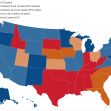Last week, an Arizona judge ruled that a 19th-century law banning all abortions across the state, unless to save the life of the mother, was ruled to still be in effect following the overturn of the Supreme Court’s 1974 Roe v. Wade ruling. The 1864 law, enacted while Arizona was still a territory, was never removed or repealed from the statutes but instead remained on the books as an unenforceable law.
Pima County Superior Court Judge Kellie Johnson also stated that she was not ruling on the constitutionality of the 1864 law, but on whether the 1973 injunction in Roe v. Wade overturned it, which in her opinion, it did not.
The 1864 law that is still in the Arizona Revised Statutes as ARS 13-3603 requires a punishment between two to five years for anyone who directly or indirectly provides the means for an individual to have an abortion. The law is written in a way that could possibly include modern innovations such as the abortion pill to be included in the ban; however, lawmakers and Planned Parenthood of Arizona are uncertain.
In 1974, the Supreme Court ruled in Roe v. Wade that certain Constitutional liberties, which protect individual privacy, include the right to abortion because it is an individual’s personal privacy right to make decisions that will affect their own body. The Supreme Court was upholding precedent in protecting intimate and personal decision-making from government interference. The 7-2 ruling aligned the decision of whether to continue a pregnancy with the privacy of an individual to make decisions on marriage, contraception, education, and family relationships. In other words, before viability, the government could not get involved.
Then, in June 2022, the U.S. Supreme Court ruled in Dobbs v. Jackson Women’s Health Organization that there is no constitutional right to abortion, overturning the 1974 decision. The 6-3 decision held that the U.S. Constitution does not confer a right to abortion and that the authority to regulate the procedure is therefore returned to the states.
The current state of abortion procedure availability in Arizona is in turmoil. After Johnson’s ruling, Planned Parenthood, Choices Women’s Center in Tucson, and Camelback Family Planning in Phoenix all paused abortion services. Planned Parenthood asked the Pima County court to put a hold on the ruling because it added confusion over a recently passed law in the Republican-led Arizona legislature that put a ban on all abortions after 15 weeks.
Johnson refused to put her order on hold on Friday, September 30th, stating that the abortion rights groups that are expected to appeal the order are not likely to prevail.
Prescription abortions can be used up to the tenth week of pregnancy and consist of two-drugs, mifepristone (RU-486) and misoprostol. The drug was developed by a French pharmaceutical company in the 1980s and didn’t receive U.S. Food and Drug Administration approval until September 2000. Today it accounts for more than half of all abortions in the United States.
After ten weeks there are several types of procedures to end a pregnancy that must be conducted in a clinic. According to the CDC, in 2019 there were 625,000 legally induced abortions reported in the United States.
Currently, the Republican-controlled Arizona Legislature approved legislation allowing abortions until the 15th week of pregnancy. Judge Johnson ruled that any law passed since the overturning of the Roe v. Wade decision is legally irrelevant because this original law was never repealed.
In Arizona Governor Doug Ducey’s opinion, the judge never specifically voided this current law that was to take effect on September 24th allowing abortions until 15 weeks of pregnancy.






